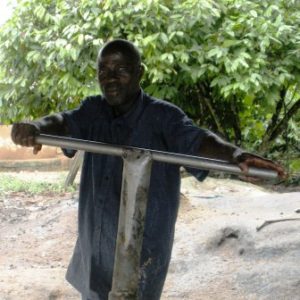
Douglas
Douglas has been living in the village of Antwikwaa for the last 30 years, and was attracted to this area by the cocoa farming business. He and his wife have four children (three girls and one boy) all of which are attending school.
Douglas has two parallel activities, depending on the season. Between March and August he focuses his work on palm oil harvesting and processing and from August till December on cocoa harvesting. He has 10 acres of cocoa and 7 acres of oil palm.
He has participated into two consecutive loan cycles of the Microsfere project; in the first one he registered for palm oil processing and in the second one for cocoa farming. In the first loan cycle, he received 100 GHC (about 50 euro) as loan, and used it to hire labour to weed and prune his oil palm farmland; this enabled the palm fruits to yield more during the period, and consequently Douglas was able to get a good revenues to pay for school fees and pay back the loan. Douglas says that receiving the first loan was a great relief to him because at the time he did not have any money to undertake the necessary farming tasks.
In the second loan cycle his loan went up to 300 GHC (about 150 euro), and contrary to the first cycle where loan repayment was monthly, now he has to make two bulk payments in October and December 2010, which is the end of the cocoa selling season and cocoa farmers are having cash from the cocoa sale.
Concerning his views of the Microsfere project, Douglas said that microfinance is now closely linked with forest conservation. According to him, the whole community has now realised that there is the need to protect the forest at all cost, because thanks to the protected area (the Kakum National Park) they are now having the microfinance scheme operating in the community. Community members have promised to be on the lookout for poaching and any other activities that may endanger the natural resources.

